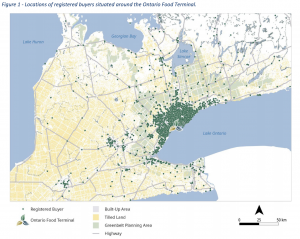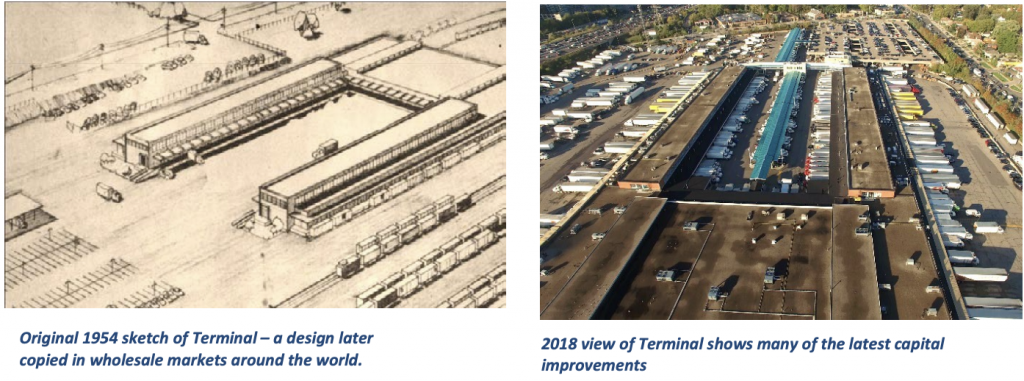 The Golden Horseshoe Food and Farming Alliance (GHFFA) has recently released a report on the Ontario Food Terminal (OFT): A Priceless Hub in Ontario’s Food Value Chain.
The Golden Horseshoe Food and Farming Alliance (GHFFA) has recently released a report on the Ontario Food Terminal (OFT): A Priceless Hub in Ontario’s Food Value Chain.
By examining the Terminal and its role in providing fresh produce and horticultural products throughout the Greater Golden Horseshoe, the report shows that the OFT is a crucial contributor to Ontario’s food value chain; it’s both a major employer and economic generator, and, less directly, an entity that contributes to the health and well-being of the population.
The OFT is the only wholesale produce market of its kind in Canada, and one of the four largest in all of North America. Yet the OFT is unique among North American wholesale produce markets as it provides dedicated facilities for local growers, as well as the more traditional focus on wholesalers who maintain a vast network of business contacts across the region and suppliers from around the globe.
The report was first instigated following government comments that cast doubts on the future of the OFT. The GHFFA, with support from the City of Toronto, commissioned the Canadian Urban Institute (CUI) to update a 2004 CUI report that identified the OFT as a ‘unique asset in the central Ontario economy,’ with the goal of adding a qualitative dimension.
Although the government has since confirmed the OFT will stay put and designated it a ‘Provincially Significant Employment zone’, an update to the 2004 study was still needed to explore and document the many improvements that have taken place over the past 15 years.
Since 2005, the OFT Board has invested more than $47M in capital improvements, resulting in operational efficiencies that lay the groundwork for food traceability systems and additional on-site expansion. (The Terminal is owned and operated by the OFT Board, an agency under OMAFRA, but is entirely self-sufficient and receives no public subsidies.)
Currently, the OFT is distributing more than two billion pounds of local and imported produce annually—35%-40% is produce grown in Ontario—providing an essential outlet for more than 1,500 Ontario growers.
As a centrally-located facility, farmers and wholesalers interact with more than 5,000 registered buyers, whose reach extends from Toronto’s main streets to thousands of stores, wholesalers and other businesses throughout Ontario, Quebec, Atlantic Canada and beyond.
When you include workers employed by tenants at the Terminal and other users, about 2,000-2,500 people work at the OFT.
We encourage you to access the report here, learn more about the Ontario Food Terminal and its role in our country’s food value chain and economy, and share with those that may be interested!
The report also highlights some key challenges to be faced in the years ahead, such as technological innovation and environmental sustainability.
A glimpse of what you’ll find in the report:
Understanding the unique role played by the Ontario Food Terminal
Part one of the report:
- documents the origins of the OFT as a bold act of public policy
- traces the impacts of high level economic, demographic and environmental trends on the OFT and its customer base
- provides a detailed overview of the principal functions and economic impact of the OFT
- highlights significant changes in governance that have made it possible for the OFT to commit to a program of continuous improvement and modernization through a number of important physical and operational upgrades.
The impact of changes in public policy on the Ontario Food Terminal
Part two of the report examines:
- changes in public policy affecting the current and future viability of the OFT, ranging from health and safety issues to land use and transportation
- the experience of other North American wholesale produce markets in responding to changing markets, governance, modernization and the ability to manage plans to relocate or expand
- the inherent benefits of the OFT’s location in South Etobicoke for fostering growth and expanding economic linkages throughout Southern Ontario
The report concludes with key findings and recommendations for the consideration of the provincial government, the City of Toronto and the OFT Board.

